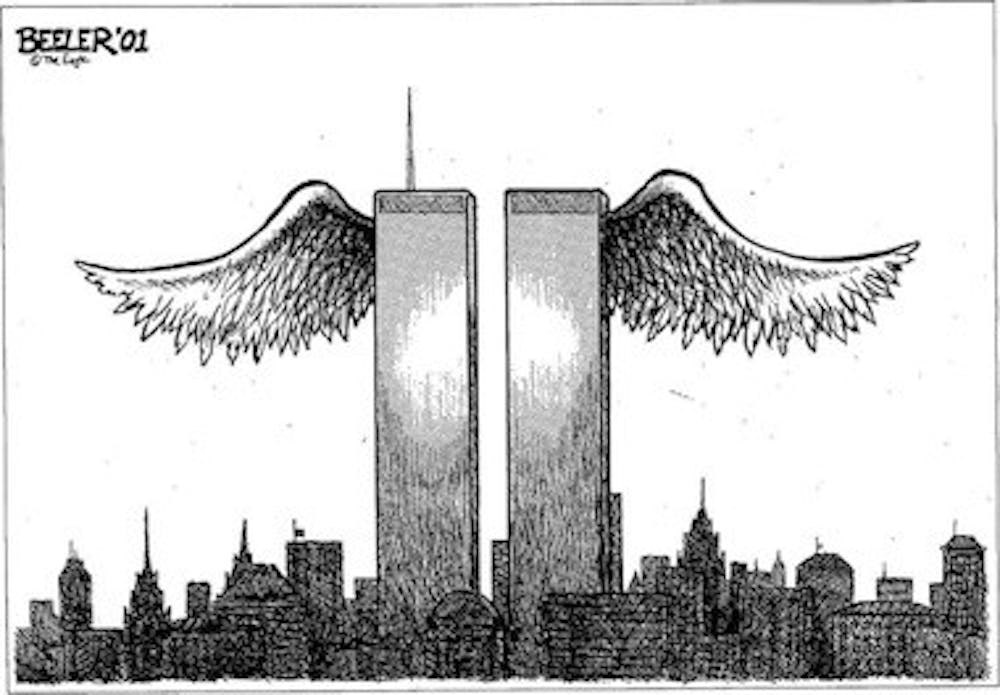Sept. 11, 2001, was a day of unity at AU in the midst of a tragedy, an emotion that would characterize the campus on that Tuesday and in the following days.
Classes were cancelled and the University was closed, with the exception of essential personnel like Public Safety.
Earlier that day, Public Safety officers found a blue and white cooler in the Butler Arena parking garage. They closed down the area for an hour to make sure the cooler was not an explosive device. A Metropolitan Police Department bomb dog determined the package was just a lunch.
With Metro buses and trains down throughout D.C. on Sept. 11, many people walked home, according to Esmond Kim in a Sept. 13 Eagle article. The downtown area of D.C. was a "ghost town" by mid-afternoon.
Off-duty Metro bus drivers picked up people for free on the street, according to Kim.
At AU, chaplains helped with the relief effort by going to every dorm to talk to students who had received bad news.
Counselors stayed late and accepted calls late into the night, a service they would continue in the weeks following 9/11 through extended hours and group grief counseling sessions. Over 1,100 students donated blood or worked a blood drive soon after the attacks.
AU community comes together after 9/11
Even in just the basic aspects of campus life, students worked together. They worked in TDR when staff with later shifts couldn’t come in because of traffic, poor public transportation and family obligations. The Resident Hall Association set up movies and events to keep students on campus for the next few days.
"The entire community has pulled together, volunteered for special assistance and focused their concerns and talents on helping others during this crisis,” former AU President Benjamin Ladner told The Eagle.
He himself attended a joint prayer session conducted by the chaplains on campus on Sept. 13. He praised the students for their attitude thus far and encouraged them to seek peace above hate.
AU also increased security to ease students’ fears. Public Safety would only allow people with AU IDs on campus, while extra resident assistants sat at the front desk to check students’ IDs. The University also spent $10,000 to have extra security guards positioned at the main gates, according to a Sept. 24 Eagle article.
Safety concerns, bomb threat arise
Not long after 9/11, AU faced another incident. A bomb threat in Anderson Hall caused the evacuation of campus to the Nebraska Parking Lot on Sept. 13.
While they waited in the parking lot, students were provided with water, food and even clothes from the AU Campus Store for those that had been in the shower at the time of evacuation. The University rerouted the shuttle system during the bomb scare. AU officials eventually found out the threats were false and came from an AU student across state lines.
Up to 40 AU alumni were still missing as of Sept. 17, according to The Eagle. Hundreds of others used the AU Alumni and Friends check-in website to say they were safe, with 230 doing so within hours of the site’s launch.
The Oct. 1 issue of The Eagle reported that approximately 50 students had either withdrawn from AU or taken a leave of absence since 9/11. A Sept. 17 article reported no students of Middle Eastern descent had been harassed in the wake of the attacks. However, only one issue later, The Eagle reported the vandalism of a Muslim student’s vehicle outside of his apartment, as well as a sharp decline in attendance at Islamic religious services.
D.C. Police Officer Chris Leary expressed his fears about life after 9/11 in a Sept. 13 Eagle article.
"My greatest concern is what is going to happen next,” he said to Esmond Kim. “I know as much as you know.”
kfroehlich@theeagleonline.com





